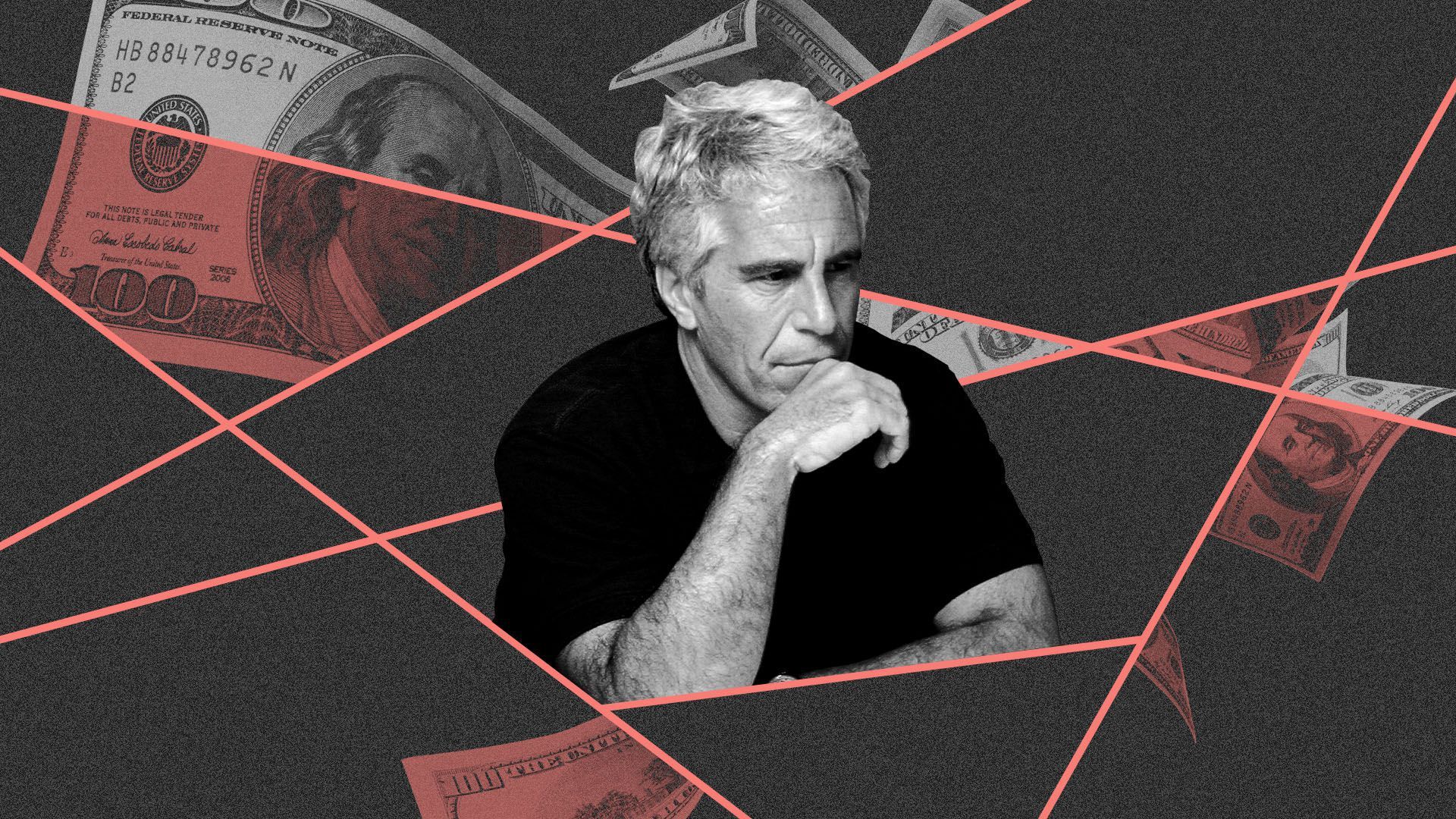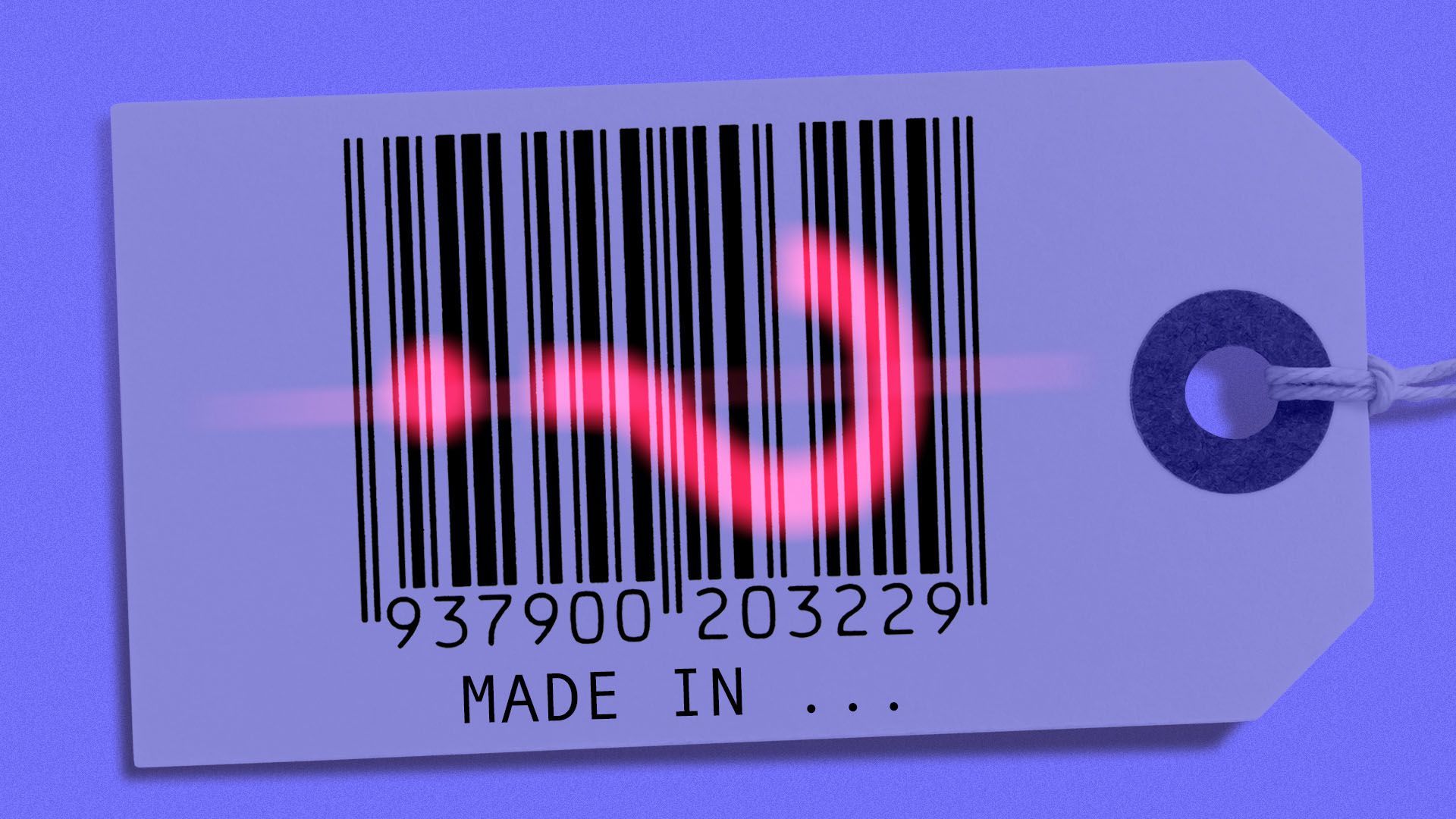January 28, 2021
Situational awareness: US GDP grew at a 4% pace in the final quarter of 2020. The V-shaped recovery is over, but at least we're not close to a double-dip recession.
- ICYMI: There was some major progress made on ESG investing this week, with new global reporting standards, a high-profile campaign from BlackRock, and even real movement from Exxon.
- In this week's newsletter: Why you're interested in GameStop; global investment flows; whether and where bitcoin is actually being used; how Jeffrey Epstein got paid; the problem with country-of-origin rules; and much more. All in 1,825 words, a 7-minute read.
1 big thing: GameStop as a metaphor

Illustration: Aïda Amer/Axios
A half-forgotten and unprofitable videogame retailer is, bizarrely and incredibly, on the lips of the nation. That's because the GameStop story touches on economic and cultural forces that affect everyone, whether they own a single share of stock or not.
Why it matters: In most Wall Street fights, the broader public doesn't have a rooting interest. This one — where a group of small traders won a multibillion-dollar bet against giant hedge funds — is different.
The appeal of fables: The core GameStop story is a simple morality tale. A scrappy and happy band of Wall Street outsiders, armed with little more than moxie and their stimulus checks, have not only made millions for themselves, but have also humbled big-name fund managers who had dared to bet against a blameless retailer.
- Schadenfreude: Melvin Capital's Gabe Plotkin is a hedge fund gazillionaire who just spent $44 million buying two adjoining properties in Miami Beach. He's also famous for short-selling — for betting that companies will fail. If he and his ilk lose money, many people feel happy.
- Lol nothing matters: The Reddit slogan "putting the FU in fundamentals" is perfectly calibrated to enrage investors who purport to care about things like valuation and price discovery. There's nothing worse than losing a game to people who aren't even taking it seriously.
Shamelessness: The conspiracy to bid up GameStop stock took place in broad daylight, enraging old-time traders with a tendency to go on unhinged Twitter rants about "market manipulation." (They never complained when Jim Cramer was doing it.)
- Concern trolling: When faced with thousands of small investors clearly having a lot of fun and making a lot of money, the Wall Street establishment, finding itself on the losing side of the trade, starts warning with great gravity that eventually the gamblers are going to lose. Bizarrely, Robinhood seems to have sided with the concern trolls, barring its customers from entering into new positions in GameStop or AMC.
- Eat my shorts: There's a highly complex financial system underlying the GameStop rally, involving discount brokerages, payment for order flow, short sales, margin calls, delta hedging of call options, and much else. Lots of people bear longstanding grudges against some or all of that system, and are taking this opportunity to shout loudly about how the GameStop story proves that they're right about... something. (Spoiler alert: 99% of the time, it doesn't.)
The attention economy: GameStop stock has risen in direct proportion to the number of people paying attention to it. It went viral in much the same way that a white-and-gold dress does.
- The internet has become reality: The GameStop story was born on Reddit, cultured on YouTube, popularized on TikTok and Twitter. Like any internet joke, the longer it lasts, the funnier it becomes — and the more attractive it becomes to meme lords like Elon Musk.
- Media wars: If you want to know what's really going on with GameStop, the place you need to be is Reddit's wallstreetbets channel, not CNBC. Both are cacophonous and confusing, and both can consume hours of traders' attention. On some level, they are competitors — and for now, Reddit is winning the relevance wars.
The Trump vacuum: Now that Donald Trump is no longer taking up a permanent position in news consumers' brains, other parts of the news cycle expand to fill the space available. Quite literally: CNBC expanded its programming by an extra hour yesterday, thanks to all the demand for GameStop-related content.
The bottom line: Whatever your interests, there's something in this story to nab your attention. Grab the popcorn, it's not over yet.
Bonus: The meltup's real-world positive consequences
Thanks to Reddit, AMC Entertainment has managed to take $700 million of debt off its balance sheet, as well as raising $506 million of fresh cash in the stock market.
Driving the news: The movie-theater chain and hot meme stonk of the moment converted $100 million of junior debt into equity on Monday, while also raising fresh equity capital. Then, on Thursday, it announced that $600 million of senior debt had also been converted into equity, at a price of $13.51 per share.
- Context: AMC's market capitalization was just $220 million at the beginning of this month. As of the close of trade on Wednesday, that number had grown to $2.2 billion.
2. Where global investment is flowing


Cross-border investment fell off a cliff in 2020, dropping 42% to $859 billion from 2019's $1.5 trillion, according to official UN figures.
By the numbers: Developed countries saw a 69% reduction in inflows.
- The U.K. actually saw an outflow of $1.3 billion, after inflows of $45 billion in 2019: Investors were more interested in taking money out of the Brexit-hit nation than they were in putting money in.
- The U.S. dropped to $134 billion, while China was one of the few gainers, seeing $163 billion of inflows and gaining the top spot for the first time.
3. What bitcoin is used for


Now more than ever, bitcoin as “digital gold” is the prevailing narrative fueling big-name adoption, writes Coindesk's Zack Seward. Bitcoin is something to be bought and stored, not something to be spent or used.
Why it matters: Bitcoin as a store of value is trouncing bitcoin as a medium of exchange. While the price of bitcoin is near its all-time highs, usage of bitcoin for anything other than investing has slowed.
By the numbers: Roughly 60% of all bitcoins have not moved in at least a year. The average time bitcoin is being held in individual wallets recently surpassed 1,000 days for the first time.
Between the lines: That said, bitcoin does function as a currency in two key places: darknet e-commerce and countries with economic instability.
- Darknet volumes are still seeing a steady upward trend. Such marketplaces drew roughly $1.5 billion in revenue in 2020, up from just under $500 million in 2015. Overall, about 1% of crypto transactions last year were for illicit purposes.
- Kenya, Venezuela, Nigeria and Colombia lead the pack in peer-to-peer exchange volume, which is the sector’s best proxy for grassroots activity. Even among the leaders, however, volumes remain tiny. Nigeria, the leader, saw $353 million in P2P volume in 2020 — a number that’s been fairly flat for the past three years.
The bottom line: For now, bitcoin is more cryptoasset than cryptocurrency. Take it from Coinbase, the San Francisco crypto exchange prepping to go public:
- “The fact that wallet-count is outpacing the volume of on-chain transactions illustrates the market’s belief that Bitcoin’s primary application is as a store of wealth,” Coinbase wrote in an annual report published last week. “In short, people are holding their Bitcoin rather than sending or spending them.”
Interested in more Axios crypto content? Please click here to be on our list if we launch something in the space.
4. How Jeffrey Epstein got paid

Illustration: Sarah Grillo/Axios
It's been one of the central mysteries of the Jeffrey Epstein saga: How did the notorious pedophile get so rich?
- A partial answer to that question arrived on Monday with the release of a report detailing how and why Apollo Management founder Leon Black paid Epstein some $148 million, including $70 million in 2014 alone.
The big picture: Epstein seems to have sought out individuals who were so rich that they faced tax bills well into the billions of dollars. He would then offer his services as a friend, confidante, and general billionaire whisperer.
- His pay: Either a flat fee of as much as $40 million per year, or — more commonly — a percentage of the money he saved you on taxes. For every $100 you saved, he would ask for a take between 5% and 10%.
What they're saying: More than 20 people who dealt with Epstein agreed that he was "disruptive and caustic" and eager to take credit for others' ideas, according to the report. He also, they said, "had creative ideas that no other advisor had proposed," and "provided advice that conferred more than $1 billion and as much as $2 billion or more in value to Black."
- Epstein was an expert on Grantor Retained Annuity Trusts, or GRATs, despite having no training as an accountant or lawyer. Epstein saved Black at least $500 million in taxes on one of his GRATs.
- Black credited Epstein with also saving him at least $600 million in taxes on a separate transaction, although later Epstein failed to demonstrate that the central idea was really his.
Beyond taxes, Epstein played a central role in building up Black's family office (the group of people managing Black's wealth) — in large part by persuading Black and his family to concentrate on such matters.
- There were "myriad esoteric issues" where Epstein made himself useful, ranging from art to yachts to airplanes.
The bottom line: Epstein was not really a provider of financial services. As Washington lawyer Jack Blum told the NYT, the best lawyer in the world would never be able to charge this kind of money. Rather, Epstein held himself out as someone who understood billionaire problems in a way that only a fellow billionaire could. And he charged accordingly.
5. The gnarliest concept in trade economics

Illustration: Sarah Grillo/Axios
President Joe Biden wants the 650,000 vehicles operated by the federal government to be electric, union-made — and made in America. As Axios' Joann Muller reports, even managing the first two would be extremely difficult. The third, however, is particularly problematic.
Why it matters: We live in a world of highly complex global supply chains, where "made in" designations are increasingly difficult to determine.
It is impossible to overstate how labyrinthine and bottomless these rules are. The official World Customs Organization handbook barely scratches the surface, but all you really need to do is see the abject fear in the eyes of any international economist when you say the magic words "rules of origin."
- Biden wants to change those rules, and in doing so he wants to discourage global supply chains in favor of a dream of purely domestic manufacturing. It's not clear whether changing the rules or moving the factories is the more difficult task.
Consumers in post-Brexit Britain are learning the hard way that even when there are no tariffs on goods from the EU, country-of-origin rules can end up saddling them with large and unexpected bills added onto shipments from Europe.
The big picture: This is deglobalization in action. Country-of-origin regulations are like kryptonite to efficient global supply chains. The more of them there are, the worse that is for all global trade.
6. Coming up: Big Tech earnings

Illustration: Sarah Grillo/Axios
Alphabet and Amazon release fourth-quarter earnings on Tuesday, writes Axios' Courtenay Brown.
Why it matters: It caps a blowout year for Big Tech.
- Analysts expect Amazon to report over $100 billion in revenue in a single quarter for the first time ever — joining Apple in hitting that milestone.
- Only two other American companies have ever done that: Walmart and ExxonMobil, per the New York Times.
Alphabet won't join the $100 billion club. Rather it’ll report roughly half that in revenue ($53 billion) — up from $46 billion in the prior year.
7. Building of the week: Putin's palace

Via Navalny
Jailed Russian opposition leader Alexey Navalny is doing a great job of remaining in the headlines.
- Nationwide protests in Russia have demanded his release, as has President Biden.
- Navalny's 113-minute video reporting on a secret palace allegedly belonging to Putin has been viewed almost 100 million times on YouTube. (Putin denies the palace is his.)
The 190,000 sqft castle, complete with 11 bedrooms and its own casino and hockey rink, is in a no-fly zone at Cape Idokopas on the Black Sea. It is largely inaccessible by land, sea, or air.
- The architect is reportedly Lanfranco Cirillo, an Italian who recently gained Russian citizenship and who says he loves Russia with all his soul.

